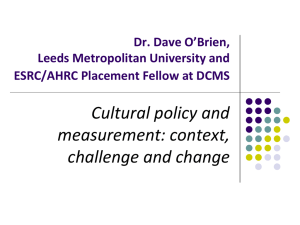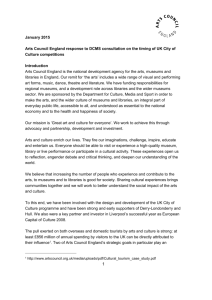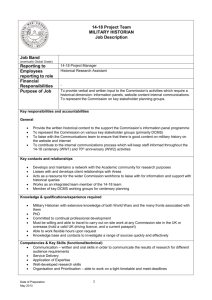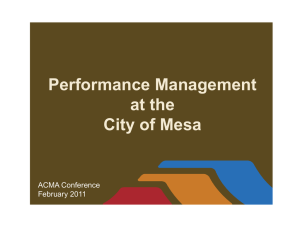UK City of Culture consultation
advertisement
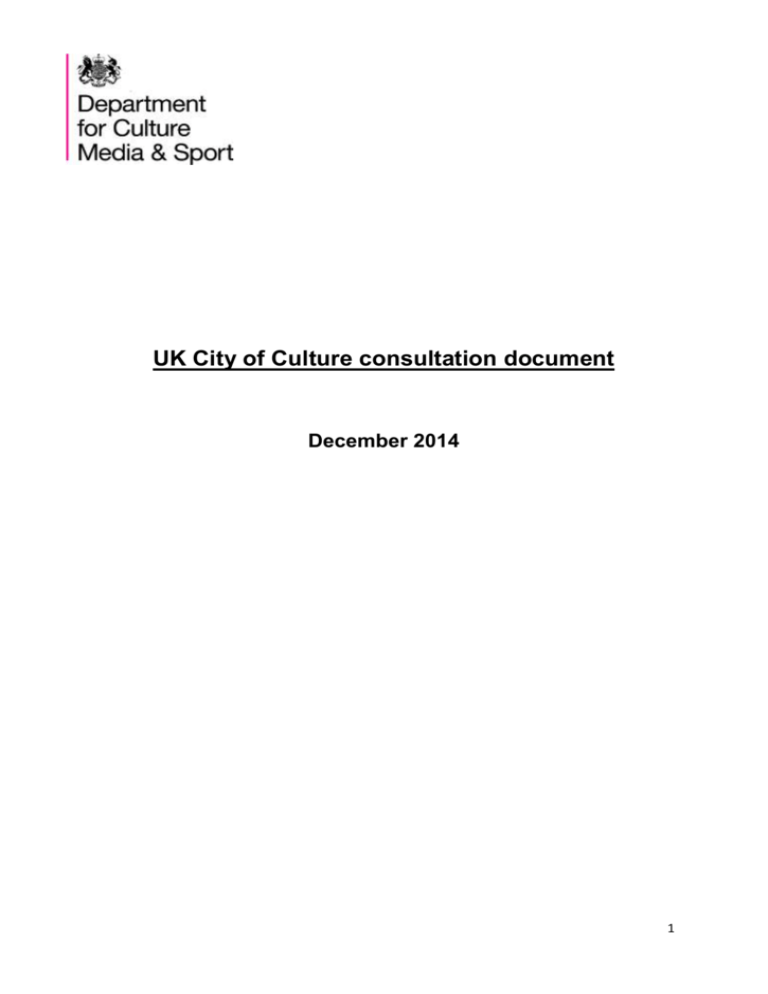
UK City of Culture consultation document December 2014 1 Contents Summary Page 3 Background 4 Questions 8 How to respond 13 2 Summary 1. The Department for Culture, Media and Sport runs the competition for the UK City of Culture. This programme, inspired by Liverpool’s time as European Capital of Culture in 2008, is more than just a title: it uses culture and creativity to bring communities together, start new dialogues and help artistic talent to grow. 2. Derry-Londonderry was the first UK City of Culture 2013, following a competitive selection process in 2009/10. Hull was selected as UK City of Culture 2017, following a competitive selection process in 2013. 3. Continuing the four year cycle would result in the next UK City of Culture year being held in 2021. However, due to the fact that the UK is scheduled to host a European Capital of Culture in 2023, DCMS is currently reviewing the timing of the next UK City of Culture competition. 4. DCMS will be responsible for the running of the selection process for both the UK City of Culture and European Capital of Culture competitions, although the European Capital of Culture competition will be overseen by the European Commission. 5. If the DCMS decided to run UK City of Culture competitions in 2021 and 2025, this would result in three competitions in a five year period. 6. The purpose of this consultation is to assess the appetite amongst potential candidate cities to bid for one or both titles, and the willingness and ability of funding organisations to support both UK City of Culture and European Capital of Culture within a short timeframe. 7. Please email your response to melanie.crew@culture.gov.uk by Friday 23 January. 3 Background UK City of Culture What is the UK City of Culture? 1. The UK City of Culture programme was developed by the UK Government to build on the success of Liverpool as European Capital of Culture 2008 and the Cultural Olympiad in 2012, by creating a national cultural event spread over a year, focused on a particular city or area. 2. The programme aims to: encourage the use of culture and creativity as a catalyst for change, promote the development of new partnerships encourage ambition, innovation and inspiration in cultural and creative activity align the cultural excellence of national arts organsiations to support the year with cultural highlights that will attract media attention, encourage national tourism and change perceptions 3. Winning the title and hosting a year of cultural events helps cities to: attract more visitors increase media interest in the city bring community members together increase levels of professional artistic collaboration 4. Over 1m people visited Derry-Londonderry during the City of Culture year.1 And it is estimated that being the UK City of Culture 2017 will deliver a £60million boost to Hull’s local economy in 2017 alone2. What is the criteria for selection? 5. The UK City of Culture is expected to deliver a high quality cultural programme that builds and expands on local strengths and reaches a wide variety of audiences, creating a demonstrable economic impact and a catalyst for regeneration as well as contributing to community cohesion and health and wellbeing. 6. Cities and areas that bid for the title are expected to spell out their own vision for UK City of Culture and how they will use it in making a step change in their area and creating a lasting legacy. 1 http://www.derrycity.gov.uk/DerryCitySite/files/76/76901904-60cb-41bb-b7ef-783443bc21d8.pdf 2 http://www.hullcc.gov.uk/portal/page?_pageid=221,674011&_dad=portal&_schema=PORTAL&p_id=4924&p_ month=Nov-13&p_page_number=1&content=pressrelease 4 Who can bid for UK City of Culture? 7. Bids are welcomed from across the UK, but there must be a clear central urban focus to the area. This could be a city or large town, two or more neighbouring cities or towns, or a closely linked set of urban areas. The only areas precluded from bidding are London as a whole or any part of London (although this does not prevent parts of London being partners in a bid for an area outside London). 8. There is no pre-determined minimum size of population or geographical area for those that wish to bid, but the areas must demonstrate that they can host events and exhibitions at scale, both indoors and outdoors. 9. Bids are expected to be from a partnership for the area, which includes the relevant local authorities as well as other local organisations. There will need to be a lead organisation for communication purposes. Who runs the selection process? 10. UK City of Culture is a UK-wide programme, developed by DCMS in consultation with the devolved administrations in Scotland, Wales and Northern Ireland. The competition process to select the UK City of Culture is managed by DCMS, and supported by a working group representing a range of cultural organisations. 11. The initial assessment process will be based on the assessment criteria set out by DCMS (this will be set out in full when the bidding process begins), and carried out by expert assessors appointed by DCMS. The expert assessors will then provide advice and recommendations to an Independent Advisory Panel, appointed by DCMS, at the shortlisting stage. The shortlisted cities will be able to revise their applications in the light of the comments and feedback from the panel. 12. The Panel will make a final recommendation to the Secretary of State for Culture, Media and Sport who will make the final decision. When would the process take place? 13. Ordinarily, the bidding process for UK City of Culture 2021 would launch in early 2017, with the preferred city selected and announced within Hull’s cultural year. However, due to the fact that the selection process for the European Capital of Culture 2023 will begin at the end of 2016 and take place throughout 2017, if we decide to contiunue with a 2021 competition then the bidding process may need to be brought forward to the start of 2016, 5 What support is available for bidding cities? 14. It is the responsibility of each area to develop its own bid using its own resources and those of its partners. There is no national funding available to pay for the costs of bidding. DCMS and the expert assessors will not be able to provide detailed advice to assist the development of bids. Is there funding for the successful city? 15. There is no direct national funding from the UK Government for events and initiatives related to the UK City of Culture programme as one of the driving principles is to bring people together within existing resources. Bids are therefore expected to be aligned with local resources and budgets, with evidence of a credible fundraising plan, including the development of new sources of funding. European Capital of Culture What is the European Capital of Culture? 16. The European Capitals of Culture programme began in 1985 as ‘European Cities of Culture.’ It was formalised as an EU programme in the late 1990s, with the first European Capitals of Culture designated for 2005. Decision 445/2014/EU provides for two Member States to host a European Capital of Culture each year. 17. The programme is designed to highlight the richness and diversity of cultures in Europe, celebrate the cultural features Europeans share, increase European citizens’ sense of belonging to a common cultural area, and foster the contribution of culture to the development of cities. 18. Glasgow was European City of Culture in 1990. Liverpool was European Capital of Culture in 2008. The UK will next host a European Capital of Culture in 2023, together with Hungary. 19. Winning the title and hosting a year of cultural events helps to: Regenerate cities Raise the international profile of cities Enhance the image of cities in the eyes of their own inhabitants Breathe new life into a city’s culture Boost tourism 6 What is the criteria for selection? 20. In order to be selected as European Capital of Culture, cities must demonstrate how they meet criteria set out within 6 categories: Contribution to the long-term strategy European dimension Cultural and artistic content Capacity to deliver Outreach Management Who runs the selection process? 21. The competition process to select the European Capital of Culture 2023 is expected to be managed by DCMS. An expert panel, appointed by the European Commission, European Council, European Parliament, the Committee of the Regions, and DCMS, will assess the applications against the criteria (to be set out in full when the selection process commences) and will draw up a shortlist. The shortlisted cities will then be able to revise their applications in the light of the comments and feedback from the panel. 22. In the final selection stage, the panel will assess the revised applications from the shortlisted cities and select one city to recommend as European Capital of Culture for the UK in 2023. The selected city will then be designated by the UK Government at least 4 years before the year of the title. Between designation and the start of the year of the title, the city’s progress will be monitored by the expert panel. When would the process take place? 23. The application process will begin at the end of 2016, with the deadline for applications expected to be in the autumn of 2017. Is there funding for the successful city? 24. Once the European Capital of Culture has been designated, the panel will monitor the city’s progress over the next 4 years. At the end of this monitoring period, the panel will decide whether to recommend that the European Commission pays the Melina Mercouri prize. The current value of the Melina Mercouri prize is €1.5 million per city. 7 Questions Part 1: UK City of Culture: timings The UK is hosting a European Capital of Culture 2023. The competition will begin in late 2016/early 2017. If we have a UK City of Culture 2021, the UK City of Culture competition will need to be launched by January 2017 and concluded by December 2017 at the latest, to allow the winning city sufficient time to plan for 2021. 1. Should the DCMS run a UK City of Culture 2021 competition when the European Capital of Culture selection competition will take place around the same time? a. Would potential candidate cities feel obliged to bid for only one title? If so, which competition would be of most interest to cities? b. Would stakeholders and funding bodies realistically be able to support both competitions? c. Should the DCMS postpone the UK City of Culture 2021 competition, and move to a UK City of Culture 2025 instead? Consideration There are many benefits involved in bidding for competitions like UK City of Culture or European Capital of Culture. However, we are aware that the process of submitting bids can be costly and time consuming for cities. Holding two competitions in a short time period may lead to cities considering themselves to be candidates for only one of the titles. We do not want to devalue the importance of the UK City of Culture by suggesting that cities have to choose. In addition, the potential overlap between selection competitions could create confusion and might act as a deterrent to cities which might otherwise have been tempted to compete for both titles. It may also be too much to expect cultural organisations to provide financial support for two competitions in a short period of time (potentially, two UK City of Cultures and an European Capital of Culture in a five-year period) and with overlapping preparation and delivery periods. However, the competitions do serve different purposes, and are aimed at different cities with different needs and objectives in mind. There is, for example, the requirement for a significant European component in European Capital of Culture. It may, therefore, be possible for the 8 competitions to successfully sit alongside one another. Postponing the UK City of Culture competition could result in losing the momentum of the programme, which has been very successful to date. 2. If DCMS does decide to run a UK City of Culture 2021 competition, when should the selection process take place? Would cities prefer: a. to bid for the UK City of Culture competition at the start of 2016, before the European Capital of Culture selection competition begins at the end of 2016? UK City of Culture 2021 2016 Competition launched January 2017 2018 Bids to be submitted by 30 April. Initial selection process in MayJune. Final selection process in Oct. European Capital of Culture Decision made by end of the year Competition Initial bids to be launched towards submitted by August the end of the year Initial selection process by the end of the year Final bids to be submitted by the summer Decision made by end of the year b. to have the two competitions run simultaneously? 2016 UK City of Culture 2021 2017 2018 Competition launched January Bids to be submitted by 30 April. Initial selection process in May-June. 9 Final selection process in Oct. European Capital of Culture Competition launched towards the end of the year Decision made by end of the year Initial bids to be submitted by August Initial selection process by the end of the year Final bids to be submitted by the summer Decision made by end of the year * It is worth noting that there are Scottish Parliamentary elections taking place in May 2016, and local elections taking place across the UK in May 2017. Part 2: Future of the UK City of Culture DCMS is taking this opportunity to review how the UK City of Culture competition works, and whether improvements or changes could be made to the model that is currently in place. In the past DCMS has provided the majority of the funding for the selection process of the UK City of Culture competition by covering the cost of the external consultants employed to assess the initial bids. The final selection process, in which an independent panel assess the shortlisted bids, and then returns 12 months before the year is to begin, is funded by the preceding winning city. No decisions have yet been made on the funding of any future UK City of Culture competition, and we are currently exploring whether this funding model works effectively. 3. How should future UK City of Culture competitions be funded? a. Could we ask bidding cities to pay an ‘entry fee’ to help cover the cost of the competition? b. Could we ask the winning city to pay for the whole of the next competition through the sponsorship funds they could potentially raise? 10 Consideration Whilst we do not want to deter cities from bidding, an entry fee could help to cover the cost of the competition and provide security for future competitions. This could potentially be paid for through cities’ sponsorship packages. However, it is unclear whether potential national sponsors would be willing to sign up with a single city at the outset of the competition: it is possible that they would be inclined to wait at least until the shortlist is announced. In addition, there is a chance that the prospect of having to find a national sponsor at the outset and/or having to fund the whole of the next selection process from whatever sponsorship they were able to secure might deter cities from entering the competition. Is there scope for the sponsorship of the UK City of Culture at a national level instead? 4. What sort of organisation is required to support the UK City of Culture? a. Should the competition continue to be run by DCMS or do we need a new single purpose body to support it? b. Could it be managed within an existing organisation? Consideration Establishing a new single purpose body could help to maintain the momentum and profile between the four-yearly title years, support cities in preparations for the year of the title and in legacy planning and delivery, manage the transitions from one city to the next, and manage the links between the Stakeholders Working Group, independent advisory panels, other cultural organisations and DCMS. However, we would need to be clear about the division of responsibilities and reporting and accountability lines, and we would need to carefully consider how such a body would be established, what powers might be needed, how funding requirements would be met, and what staff might be needed. There may be a potential conflict of interest if a cultural organisation were to take on the overall administration of the UK City of Culture programme: for example, tensions between requirements for awarding grants and the desire to ensure the overall success of the programme, or from too great a focus on an aspect of the programme that fits with the organisation’s main purpose, at the expense of other aspects in which it had less experience and expertise. Any cultural organisation leading on this must be able to take a broad view across the full range of sectors and areas of impact. 11 A single purpose body may also have as part of its aims to co-ordinate, collate and disseminate research that may help future cities or other public services in adapting culture to deliver more social benefit to education, health and civic engagement. 12 How to respond 1. You are invited to respond to the questions set out on pages 8 – 11. 2. Please email your response to melanie.crew@culture.gov.uk. Alternatively, post it to DCMS at 4th floor, 100 Parliament Street, London SW1A 2BQ, marked for the attention of Melanie Crew, Arts team. 3. This consultation will close at 5pm on Friday 23 January 2015. 13
